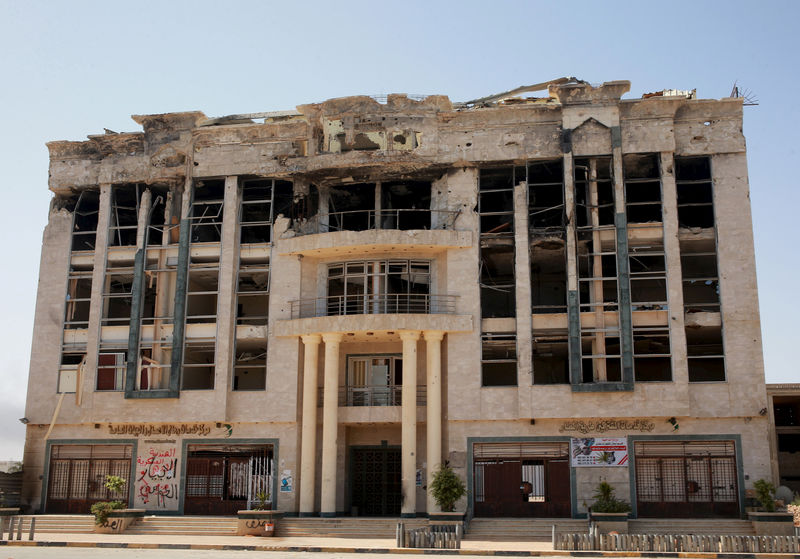By Robin Emmott
BRUSSELS (Reuters) - Europe's bold intentions to support Libya's new U.N.-backed government are faltering as France and Germany resist a bigger role to rebuild the failed state, scarred by the West's 2011 air campaign to help topple dictator Muammar Gaddafi.
The European Union and NATO have said they stand ready to help the unity government in Tripoli, if requested, to combat smugglers sending migrants into the Mediterranean towards Europe. Tripoli, for its part, faces a threat from Islamic State fighters who exploited past conflict between rival governments to extend their power.
In a letter, Libyan Prime Minister Fayez Seraj sent a broad request for security training, but now Germany and France want the United Nations to move first, something Russia is unlikely to support because it feels the West went too far in 2011.
Germany has suggested that the NATO alliance may need an invitation from the European Union to help in Libya.
"Europeans now have what they asked for, namely a unity government ruling from the capital," said Mattia Toaldo, a Libya expert at the European Council on Foreign Relations. "They should take care not to burden it with unrealistic demands, from ending the migrant crisis to defeating Islamic State."
Germany is wary of a long-term commitment, scaling back the language in a statement by European Union foreign ministers this week by insisting the bloc seeks U.N. Security Council approval to stop arms trafficking even on the high seas, diplomats said.
France sent special forces and intelligence commandos to conduct covert operations against Islamic State in Libya, Le Monde reported in February. But French diplomats in Brussels are more cautious about a big NATO role, despite a warning last month from EU foreign policy chief Federica Mogherini that some 450,000 refugees in Libya could flee to Europe.
Deployment of NATO combat troops appears out of the question.
"We are looking at a support role, one that is low profile," said a senior French official involved in Libya policy. "The risks are very real and our resources modest."
The remarks contrast with gathering momentum a month ago at EU and NATO headquarters in Brussels and a special dinner of EU foreign and defence ministers in Luxembourg in which Libyan maritime and security missions were on the table.
"The situation is apparently not grave enough for us to act," said a senior NATO diplomat. "We need a real crisis."
Just 480 kilometres (300 miles) from Europe's coast, Libya's slide into anarchy over the past five years has made it an outpost for Islamic State militants and a staging post for sub-Saharan African migrants aided by traffickers.
But the failure of the West's 2011 intervention still weighs on Western officials, even as the United States urges the Europeans to take a bigger role in securing its neighbourhood.
"Washington tells us Europe's southern border ends in the Sahara, not in the Mediterranean," said an EU defence official.
"SECURITY VACUUM"
Britain and the United States want a much bigger role for both NATO and the European Union. U.S. Secretary of State John Kerry has urged NATO to link up with the EU's naval mission "Sophia" in the Mediterranean to tackle smugglers.
Lawmakers in Britain say the EU's naval mission in the Mediterranean is too limited to have an impact on smugglers, as it is too far out to destroy boats, catch traffickers or head off migrants trying to reach Europe by sea from Libya.
"A mission acting only on the high seas is not able to disrupt smuggling networks, which thrive on the political and security vacuum in Libya, and extend through Africa," a British parliamentary report said this month.
Alain Le Roy, the secretary general of the EU's foreign service, defended the Sophia mission, saying that more than 80 traffickers had been arrested and up to 200 boats destroyed.
EU foreign ministers have approved training of Libya's navy and coast guard in international waters. Sophia's chief, Italian Rear Admiral Enrico Credendino, told La Repubblica on Wednesday the coast guard could be trained in 14 weeks.
On the ground, the United States and Italy, Libya's former colonial power, are leading calls for action and Rome is willing to send around 5,000 personnel to help the country. Washington is developing military options including deploying U.S. special forces against Islamic State militants.

Germany does not want its personnel on Libyan soil but is willing to revive an EU border guards programme in Tunisia.